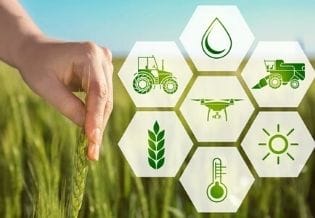About the Journal of Precision Agriculture
Advancing data-driven farming through rigorous peer-reviewed research that integrates cutting-edge sensors, spatial analytics, and intelligent automation to optimize crop production while minimizing environmental impact.
JPA addresses the critical need for evidence-based agricultural optimization in an era defined by climate variability, resource constraints, and growing food demand. Our scope encompasses the full spectrum of precision agriculture technologies and their integration into sustainable farming systems.
We actively seek manuscripts that advance theoretical understanding, validate emerging technologies, demonstrate field-scale implementation outcomes, or provide comparative analyses of precision farming strategies across different cropping systems and environmental contexts.
JPA publishes across interconnected technology domains that collectively enable precision agricultural systems:
Remote Sensing & Geospatial Analytics
Satellite imagery, UAV-based multispectral sensing, hyperspectral data analysis, canopy reflectance modeling, spatial variability mapping, and prescription map generation.
GPS & Vehicle Guidance Systems
Real-time kinematic positioning, autonomous navigation, implement steering control, swath management, and controlled traffic farming infrastructure.
Automation & Agricultural Robotics
Autonomous field operations, machine vision for crop monitoring, robotic harvesting systems, sensor-actuator integration, and human-robot collaboration frameworks.
Variable Rate Technologies
Site-specific fertilizer application, precision seeding, targeted pesticide delivery, spatially-explicit irrigation control, and yield monitor calibration.
Soil Spatial Variability
Soil electrical conductivity mapping, texture classification algorithms, nutrient distribution modeling, compaction profiling, and management zone delineation.
Crop Modeling & Simulation
Growth stage prediction, yield forecasting algorithms, water balance modeling, phenology simulation, and crop-climate interaction frameworks.
Decision Support Systems
Expert systems for agronomic decisions, machine learning prediction models, optimization algorithms, risk assessment tools, and farmer interface design.
Precision Irrigation Management
Soil moisture sensor networks, evapotranspiration estimation, deficit irrigation scheduling, drip system automation, and water use efficiency quantification.
Crop Health Monitoring
Disease detection algorithms, pest population mapping, stress identification through spectral indices, and early warning system development.
Greenhouse Automation
Climate control optimization, hydroponic system management, LED lighting protocols, CO? enrichment strategies, and controlled environment production.
Data Management & Interoperability
Agricultural data standards, farm management information systems, cloud computing architectures, IoT sensor integration, and blockchain traceability.
Policy & Economic Analysis
Technology adoption barriers, return on investment modeling, regulatory frameworks, privacy considerations, and socioeconomic impact assessments.
Rigorous Peer Review
Expert evaluation by agricultural engineers, agronomists, and technology specialists ensures scientific integrity, methodological soundness, and contribution clarity. Our review process balances thoroughness with efficiency to provide constructive feedback within 28 days on average.
Rapid Publication Pipeline
Accepted manuscripts are published online within 2 days, providing immediate visibility for your findings. Our streamlined editorial workflow respects researchers' time while maintaining quality standards through systematic manuscript handling and production coordination.
Global Research Visibility
Open access distribution ensures your work reaches agricultural scientists, technology companies, extension services, policymakers, and farming enterprises worldwide without paywalls. JPA articles are indexed across academic databases and promoted through targeted dissemination channels.
Permanent Digital Preservation
All publications receive DOI registration and are archived through institutional repositories, ensuring long-term accessibility and citability. Your research contributions remain discoverable and usable by future generations of agricultural innovators.
- Author Copyright Retention: You maintain ownership of your work with flexible Creative Commons licensing that facilitates widespread dissemination.
- Comprehensive Editorial Assistance: Professional copyediting, reference formatting, figure optimization, and metadata enhancement to maximize publication quality.
- Social Media Amplification: Strategic promotion through JPA channels and agricultural research networks to expand readership and citation potential.
- Multilingual Abstract Translation: Optional services to enhance international accessibility and non-English-speaking researcher engagement.
- Data Repository Integration: Support for linking supplementary datasets, code repositories, and multimedia materials to enhance reproducibility.
- Transparent Review Process: Clear communication throughout peer review with constructive feedback designed to strengthen your manuscript.
- No Publication Delays: Continuous publication model eliminates issue-based backlogs, ensuring immediate dissemination upon acceptance.
- Author Dashboard Access: Real-time tracking of manuscript status, reviewer comments, and production milestones through our online platform.
JPA maintains rigorous ethical and methodological standards aligned with international best practices for agricultural research publication. All submissions must demonstrate originality, scientific rigor, and adherence to research ethics protocols.
Authors should consult our comprehensive Instructions for Authors before submission. Manuscripts can be submitted through our online portal or via email to [email protected].
JPA employs plagiarism detection software and requires ethical clearance documentation for studies involving proprietary germplasm, regulated chemicals, or environmentally sensitive locations. We enforce COPE guidelines for publication ethics and investigate allegations of misconduct systematically.
Our distinguished editorial board comprises internationally recognized leaders in precision agriculture technologies, crop sciences, agricultural engineering, and geospatial analytics. Board members provide strategic guidance on scope development, special issue curation, and emerging research priorities while serving as ambassadors for precision farming innovation globally.
Associate editors manage manuscript assignments within their expertise domains, coordinating peer review and rendering decisions based on reviewer recommendations and editorial priorities. This distributed governance model ensures specialized evaluation while maintaining consistency across publication standards.
JPA operates on an author-pays open access model to sustain high-quality editorial operations, peer review coordination, technical production, and global dissemination infrastructure. Article processing charges (APCs) are levied only upon manuscript acceptance, ensuring authors incur no costs for submitted work that does not meet publication standards.
We recognize financial constraints vary across research institutions and geographies. JPA provides APC waivers and discounts for corresponding authors from low-income countries, early-career researchers, and in cases of demonstrated need. Contact our editorial office to discuss eligibility before submission.
Advance Precision Agriculture Research With JPA
Join the global community of researchers, engineers, and innovators leveraging technology to transform agricultural productivity and sustainability. Submit your breakthrough findings to JPA and accelerate the transition to data-driven farming systems.


